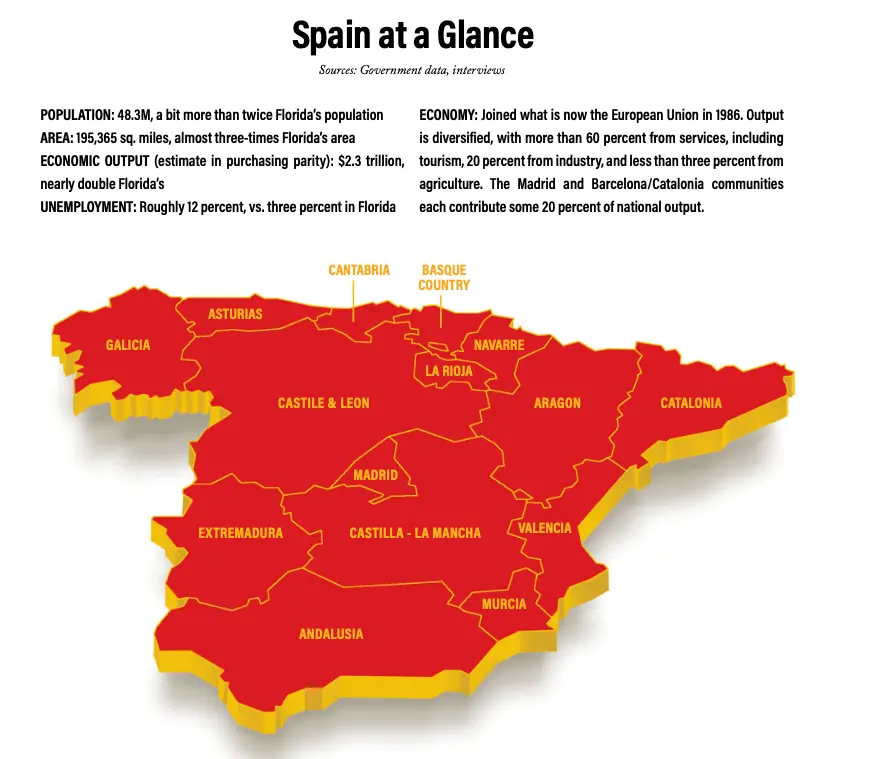By Doreen Hemlock
No other overseas nation has more companies in Greater Miami than Spain
Ever since Spanish explorers landed 500 years ago in the peninsula they named “Land of Flowers,” Spain has shared a special relationship with Florida. Spaniards in 1565 founded the first European settlement in what’s now the United States in north Florida’s St. Augustine. Spain ruled the land for two centuries.
As Greater Miami has developed since the 1960s into the U.S. business hub for Latin America and the Caribbean, Spain has strengthened that special relationship. Today, Spain has more companies in Miami-Dade County than any other overseas nation – roughly 400 which call Miami home, according to the Spain-U.S. Chamber of Commerce. Those businesses run the gamut from food and wine sellers to tile makers, construction giants, banks, retail, airlines and, recently, many tech startups.
Overall, Florida counts the United Kingdom as its top foreign investor. But in Miami-Dade, Spain ranks No. 1 by far, thanks mainly to Miami’s sturdy links with Latin America. Many Spanish companies expand first out of Europe to South and Central America, building on their common Spanish language and cultural ties. Once those businesses set up in Latin countries, many then create a Latin American headquarters in Miami to manage the regional operations, with their top executives flying comfortably out of Miami International Airport across the Latin region.

“It’s much easier to be based in Miami and travel around Latin America than to be based in Latin America and try to travel around. That cannot be overstated,” says Ilona Vega-Jaramillo, who heads up international business for Miami-Dade County’s economic development group, The Beacon Council.

The depth of Spain-Miami links was clear in June when a Miami-Dade delegation attended Madrid’s South Summit tech conference. Delegates encouraged more Spanish ventures to set up in Miami, much as Madrid-based MedUX did two years ago to expand its business measuring telecom networks. “Miami has always been a bridge between Spain, the U.S., and Latin America, but now it is also a regional reference for entrepreneurship and innovation technology through the #MiamiTechMovement,” CEO Luis Molina said in opening MedUX’s Miami home in 2021, building on its three Latin American offices.
Of course, every country has its idiosyncrasies, and Spanish companies must also adapt to major differences in the U.S. market compared to their Iberian homeland. For starters, the U.S. market is much larger, more competitive, and lots pricier than Spain’s. Advisors suggest newcomers start small, perhaps in a co-working space or shared warehouse, and focus first on one U.S. area. And they suggest budgeting big, noting too many entrants underestimate U.S. salaries, legal fees, and costs using Spain as their reference.

“To make it in the U.S., you need more than a solid business. You need financial muscle and reserves to fund the new market expansion, because it may take two or three years to become profitable,” advises Juan Carlos Pereira, executive director of the Spain- U.S. Chamber, who formerly worked as the country manager for a Spanish renewable energy company in the United States.
Here’s a look at the trends, players, and best practices that nurture the Spain-Miami business already crucial to Miami-Dade’s global strength.
SPANISH BUSINESS ARRIVING IN WAVES: BANKS, BUILDERS, AND MORE
Spanish businesses have been crossing the Atlantic Ocean for decades, especially since Spain joined what is now the European Union in 1986. The first big wave came after many state-owned companies were privatized. Some buyers with expanded holdings felt emboldened to go overseas, especially banks such as BBVA, which was created from the privatization of state-owned Argentaria.
Next came construction companies. Many were strengthened by European funding to boost infrastructure in Spain, subsequently heading into Latin America, often to work on large government projects or private-public partnerships. They were encouraged in part by Spanish banks active in the region. Those builders then suggested their suppliers set up in Mexico, Argentina, and other Latin American markets, says Francisco Javier Garzon Morales, Spain’s trade commissioner in Miami. As those suppliers succeeded in the Americas, they in turn motivated other small- and mid-sized Spanish companies to expand west out of Europe.
Today, the United States ranks as the top destination for foreign investment from Spain with Miami the main gateway, especially for smaller Spanish firms, says Garzon Morales. Tech now makes up the largest wave from Spain, with ventures in such emerging fields as cleantech and offshore wind energy.
Madrid-based engineering firm Esteyco, for instance, recently opened a Coral Gables office to pursue U.S. Department of Energy contracts to create floating platforms for giant wind turbines in deep sea waters. Esteyco is designing two massive nesting rings, one floating deeper inside the other and together weighing some 7,000 tons, to keep the skyscraper-sized wind turbines steady at sea – with no pillar connecting them to the ocean floor. Plans call for testing the design off Spain’s Canary Islands in 2025. “I expect that [the offshore platform] will help us to change our world,” Esteyco’s energy director Ramon Lopez Mendizabal told Florida24TV recently, “and to the next generations, pass a better world.”
NETWORKS HELP SPANISH BUSINESSES GROW

Spain-Miami business links are so ingrained that an ample support network has emerged to encourage and foster those ties. Spain’s central government not only keeps a key trade promotion office in Miami but also a consulate that helps facilitate business. And several regions in Spain – known as autonomous communities – also have representatives in the Miami area.
Catalonia, which counts Barcelona as its capital, was the first region to open a Miami office more than 20 years ago. It mainly helps U.S. companies invest in the region but also helps Catalan firms expand in the U.S., says Marcos Gonzalez, the international business consultant who leads the Catalonia Trade & Investment office in Coral Gables. The office now also supports Catalonia’s recent push to become an innovation hub for southern Europe in tech, robotics, and more, “transferring knowledge back and forth, because if you don’t focus on innovation now, it will be hard to be relevant in international business later,” he says.
Among innovative Barcelona-based companies now active in South Florida are Grifols, a healthcare provider that develops plasma-based medicines and had $3 billion-plus in global revenue in the first half this year, and Factorial, a tech “unicorn” valued at more than $1 billion, which makes software for human resource functions and set up its North American headquarters in Miami this year.
“I have meetings virtually every week with Catalan startups looking to the U.S. and exploring Miami as an option,” says Gonzalez. Some firms in bio-sciences opt to set up in Boston. “In Miami, many startups say they can network faster, use Spanish to make contacts, and expand into Latin America more easily.”
Florida groups also provide support. The state’s international business promotion agency (now called Select Florida) has an office in Madrid for outreach in southern Europe, while Miami-Dade’s Beacon Council connects with Spanish firms to develop their businesses within the county.
“Spain has always been a very strategic market for us, because there are more Spanish subsidiaries in Miami than in any other city throughout the U.S.,” says the Beacon Council’s Vega-Jaramillo. The Council typically sends a large delegation of business and government leaders to Spain every other year, usually to the capital or another big city, followed by a smaller city. A cadre of Council staff then travels to Spain the next year for follow-ups and to plan the next big visit. Last year, a large delegation visited Madrid and then Vigo in northwest Galicia, meeting there with executives of banking group Abanca, among others.


The Greater Miami Convention and Visitors Bureau often joins these Miami-Dade delegations, keen to woo more Spaniards to the county. In 2022, Spain became the No. 2 country of origin for European visitors to Miami-Dade, surpassing Germany and trailing only after the United Kingdom, says Joe Docal, the Bureau’s director of travel industry sales for Europe. Some 35 flights per week now link Miami with Madrid and Barcelona on three airlines – Iberia, American, and Air Europa – making travel easier.
The first Miami group focused on Spanish business was the Spain-U.S. Chamber of Commerce, now the largest binational chamber in Florida, says executive director Pereira. The Chamber was formed in 1980 when a local lawyer realized that many of his clients were Spanish banks and other firms operating in the Americas, all facing similar concerns and opportunities. Cuba-born attorney Raul Valdés-Fauli stepped up as the first president of the group that now represents more than 500 companies in Florida.
BEST PRACTICES IN THE U.S., SO DIFFERENT THAN SPAIN


Still, Spanish companies face challenges in the U.S., the world’s most competitive market. Not only are costs often multiples higher than in Spain, but regulations differ too, such as labels required in ounces – not liters – and the type of electric plugs used. It can take years and big cash outlays to obtain some needed U.S. approvals, as exporters of Spain’s prized Iberico ham learned.
“The most common concerns we hear are about non-tariff barriers: labels, phytosanitary regulations, and issues with Customs,” said Angel Asensio, president of the Madrid Chamber of Commerce and Industry, during a recent visit to Miami to promote Spain’s international tourism fair FITUR. The strict and sometimes unexpected U.S. regulations contrast with the image of America as a free, open market.

The U.S. labor market often proves thorny, requiring greater focus on salaries, benefits, recruiting, and training. In Spain, jobs typically are harder to find and more coveted, employees more likely to stay near their family, and labor laws more employee-friendly. Employee turnover is generally lower there.
“Here in the U.S., it’s ‘Show me the money.’ Employees say, ‘I’m leaving tomorrow.’ In Spain, that’s inconceivable. You have to give a month’s notice,” says Pereira. To keep top talent in the U.S., firms must typically pay employees more than in Spain, an issue that can be contentious in talks with headquarters staff in Iberia. Advisors recommend that Spanish firms entering the U.S. send a top exec with the ear of headquarters honchos back home, so they can best get across those U.S. needs.

Also challenging is building a U.S. client base. U.S. executives often ask Spanish newcomers about their other U.S. customers. To get started, some advisors suggest entrants build on their overseas network. If a Spanish company worked with a multinational overseas that also has a U.S. division, it can leverage that relationship for a reference or U.S. introduction. Initial U.S. jobs may require competitive bidding, too.
What’s indisputable is the need for research to understand the U.S. market. “You can be a good business in Spain, but that doesn’t mean you’ll do well internationally,” says Gonzalo Arance, Select Florida’s consultant in Spain. He says too many small- and mid-sized Spanish firms skip detailed market studies and under-invest in marketing their services to stand out in the crowded U.S. market.
Mastering the U.S. ropes requires humility too, since the process takes time. “The U.S. market is tough and sophisticated,” says Catalonia’s Gonzalez. “Some newcomers see ‘El Dorado’ and approach it with an excess of self-esteem.”
Opportunities remain huge, however, with some 400 Spanish companies already working in Miami-Dade. Among the newest entrants: software maker and consultancy Hiberus, which set up a Miami hub this year to expand across the Americas.












